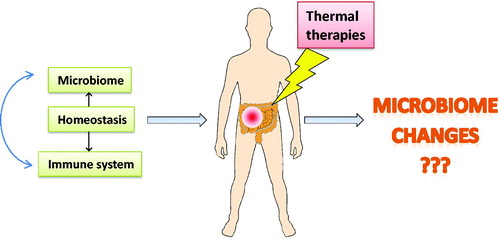Figures & data
Figure 1. Under normal conditions, the microbiome and the immune system interact to regulate each other and maintain a homeostatic balance. The composition of the microbiome is sensitive to environmental factors such as diet and a variety of other stressors (including temperature) and dysbiosis is associated with several disease states. It has been reported that the composition of the microbiome directly regulates response to anticancer chemotherapy and immunotherapy. However, the effect of thermal therapy of the microbiome and antitumor immune response is unknown.

